'We Have to Step Up and Engage'
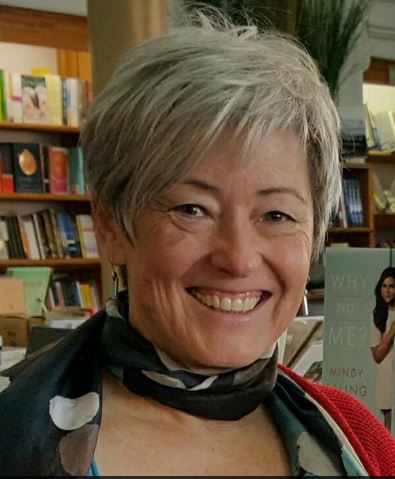

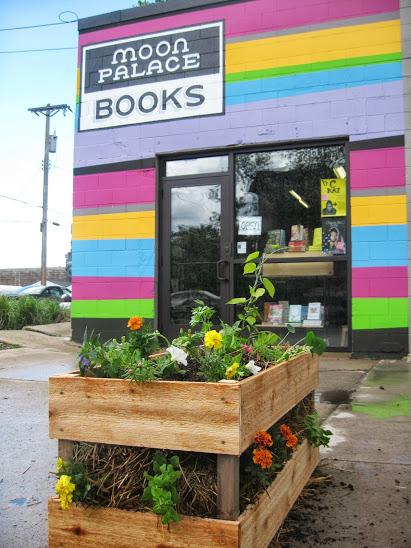
This will allow Moon Palace Books to "have nearly twice as much space, and our hours will expand--we'll be open earlier AND later than we are now. We're thrilled to be able to offer a bigger selection of books, host more events, and give everyone more opportunity to see and visit their neighborhood bookstore in South Minneapolis."
 Noelle Santos, a South Bronx native and human resources professional, plans to open a general interest bookstore/wine bar called The Lit. Bar in the New York City borough next year. Bookselling This Week reported that the theme of the bookshop will be Bronx-related, and "non-book merchandise will include reading and wine-related items as well as anything appealing to women who enjoy the arts. Santos, who said she aims to enliven the traditional bookstore business model, also hopes to imbue the store with 'a graffiti and chandelier' aesthetic, including concrete floors mixed with elegant touches and works by local artists on the walls."
Noelle Santos, a South Bronx native and human resources professional, plans to open a general interest bookstore/wine bar called The Lit. Bar in the New York City borough next year. Bookselling This Week reported that the theme of the bookshop will be Bronx-related, and "non-book merchandise will include reading and wine-related items as well as anything appealing to women who enjoy the arts. Santos, who said she aims to enliven the traditional bookstore business model, also hopes to imbue the store with 'a graffiti and chandelier' aesthetic, including concrete floors mixed with elegant touches and works by local artists on the walls."
Santos noted that Nicole Sullivan of BookBar in Denver, Colo., has served as her mentor for the past two years, adding that her business "will look completely different... even though it will be the same concept."
She also said, "I want to send the message that the Bronx is not burning anymore; the Bronx is burning with a desire to read. People think of the Bronx as just being the botanical gardens, the Zoo, and Yankee Stadium--people miss out just because of negative stereotypes. I want to do my part through literature and community gatherings to make sure that other people get a taste of what the Bronx really has to offer and to have a healthy way to communicate about certain issues.... I'm trying to create a healthy way for the new residents that we have seen moving in and the existing residents to communicate and interact with each other and actually become neighbors."
Santos is blogging about her journey to opening the store at 1stnoelle.com.
 |
|
| Kathy Bartson | |
Kathy Bartson has been named the new director of development for the Book Industry Charitable Foundation. Bartson, who has 16 years of fundraising experience with Ann Arbor, Mich.-area nonprofits and educational institutions, was most recently the development director for a nonprofit that provides permanent supportive housing for formerly homeless individuals and families. She will lead Binc's fundraising initiatives with the goal of creating a financially sustainable foundation to fund emergency financial assistance programs in support of bookstore employees across the U.S.
"I am thrilled to have Kathy join the Binc team," said Binc executive director Pam French. "The combination of her fund development expertise and her passion for our mission is ideal. She has hit the ground running, and already jumped in with ideas that will help ensure Binc is around for many years to continue supporting booksellers."
Bartson, who will be attending several fall regional bookseller trade shows, said: "Booksellers are the heart and soul of the book industry. I'm honored to be part of a team that supports these individuals and their families."
 Barnes & Noble will close its store at 3216 W. Lake St. in Minneapolis, Minn., according to the company in the process of acquiring the Calhoun Village shopping center. The Southwest Journal reported that Doran Companies' v-p Tony Kuechle "said a drug store would occupy the Barnes & Noble and H&R Block footprints, with a drive-thru running behind the property.... The current owner of the site, Pfaff Calhoun LLC, submitted plans to the city in May requesting approval of the drive-thru."
Barnes & Noble will close its store at 3216 W. Lake St. in Minneapolis, Minn., according to the company in the process of acquiring the Calhoun Village shopping center. The Southwest Journal reported that Doran Companies' v-p Tony Kuechle "said a drug store would occupy the Barnes & Noble and H&R Block footprints, with a drive-thru running behind the property.... The current owner of the site, Pfaff Calhoun LLC, submitted plans to the city in May requesting approval of the drive-thru."
While the application will go before the city Planning Commission June 27, Kuechle said they haven't started targeting new retailers for Calhoun Village: "We have to finish acquiring the site and finish negotiations with the drug store site. Some leases have flexibility, some don't."
Cameron + Company is launching Cameron Kids, an imprint designed to build on the publisher's success with children's books by engaging "children of all ages with its growing list of thoughtfully curated, acquired and produced titles." Cameron Kids is led by children's book publisher Nina Gruener and editor Amy Novesky. In addition to children's books, the publisher focuses on photography, art, food & wine, and regional interest publications.
Gruener described the new imprint as "a natural extension of what we have already been publishing. Over the years we have thoughtfully chosen each title, and it has become apparent that this gorgeous little list is ready to stand on its own. With an emphasis on beauty, simplicity, and story, we are carrying on the Cameron tradition of books that need to be books--for kids."
Cameron Kids anticipates releasing two to three new children's books each season, beginning this summer with How Do I Love Thee?, the second title in its picture-book poem series; and Love Is a Tutu, the first in the Love Is series. Fall releases will include Henry's Bright Idea, the first in the new Walnut Animal Society series; and Love Is a Truck.
Lois Duncan, a prolific author of YA suspense novels "who also chronicled her decades-long inquiry into the unsolved homicide of her own daughter," died June 15, the Associated Press reported. She was 82.
Duncan wrote more than 50 books, including Who Killed My Daughter?, Killing Mr. Griffin, I Know What You Did Last Summer, Don't Look Behind You, Stranger with My Face, Locked in Time, Summer of Fear and A Gift for Magic. Among her honors were the 2015 Mystery Writers of America Grand Master Award for a "body of work that is both significant and of consistent high quality"; and the 1992 Margaret Edwards Award from the American Library Association for her contribution in writing for teens.
Lizzie Skurnick, who has re-released some of Duncan's early work through her imprint Lizzie Skurnick Books, told NPR: "You have girls switching bodies with each other, and you have girls at a boarding school being possessed by long-dead artists. It's these dramatic situations, but the writing is as good as any literary fiction today."
Judy Blume tweeted: "I am so very sad to learn of Lois Duncan's death. We lived in New Mexico at the same time and were writer-buddies."
---
Richard Selzer, "a surgeon who turned his operating-room experiences into fictional stories that blended the gore, the beauty and the absurdity of modern medicine," died June 15, the New York Times reported. He was 87. Selzer's "old-fashioned style infused short stories, essays and memoir. His 1991 New York Times Magazine piece, 'A Question of Mercy,' about an AIDS patient requesting assisted suicide, inspired a play of the same title by David Rabe."
Selzer's books include The Doctor Stories, Mortal Lessons: Notes on the Art of Surgery, Confessions of a Knife, Rituals of Surgery and Letters to a Young Doctor.
Jerome Groopman, a Harvard professor of medicine and staff writer for the New Yorker, once wrote that Selzer "helped usher in the genre of medical writing in which the physician puts his experiences under the microscope for the lay reader's scrutiny."
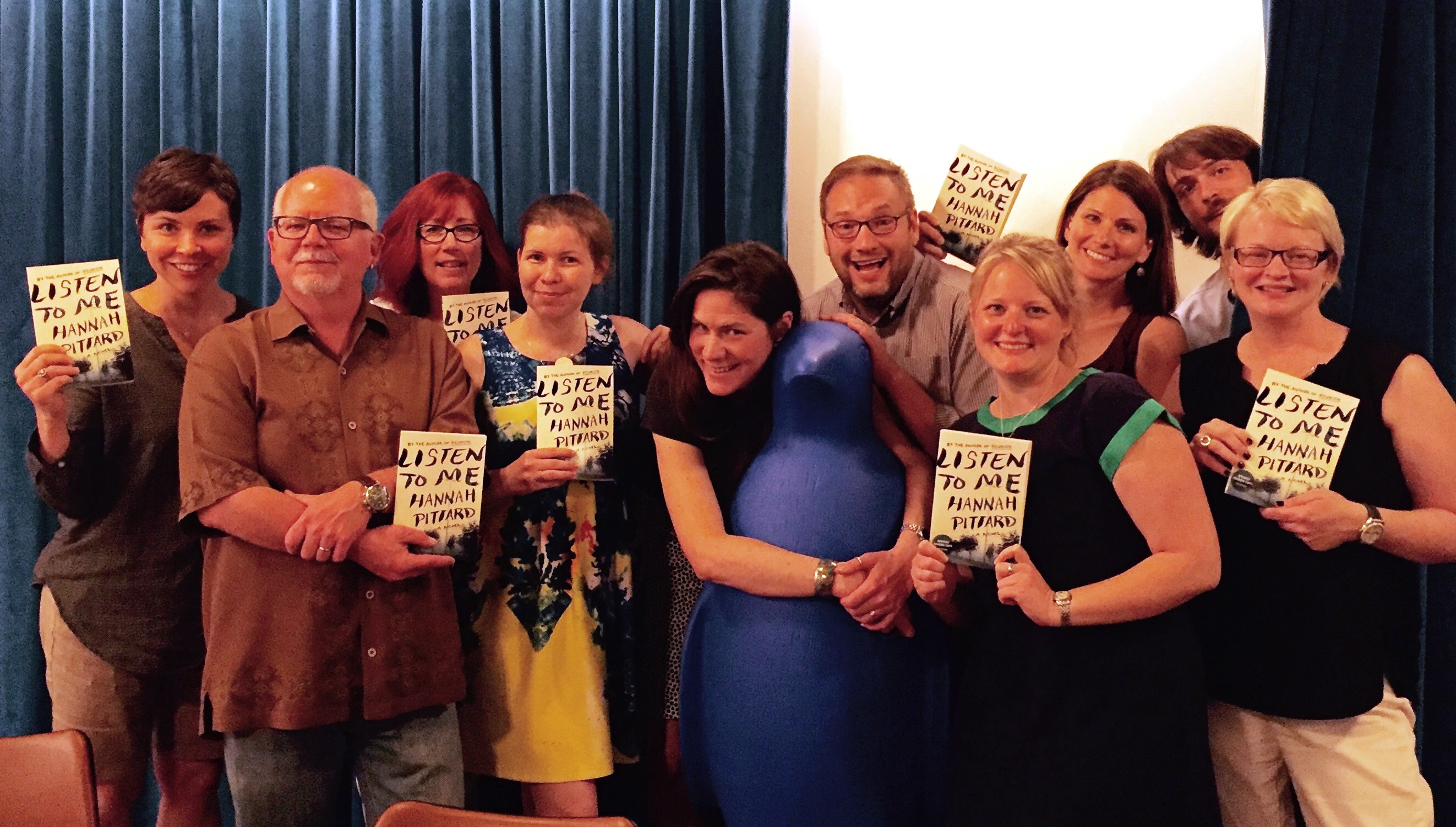 Tuesday night, author Hannah Pittard joined a crew of enthusiastic Kentucky booksellers for dinner, in preparation for the release of her new novel, Listen to Me (HMH, July 5).
Tuesday night, author Hannah Pittard joined a crew of enthusiastic Kentucky booksellers for dinner, in preparation for the release of her new novel, Listen to Me (HMH, July 5). Talk Story Bookstore, located in Hanapepe on the island of Kauai, is a "passion project of Ed and Cynthia Justus, who visited Kauai for the first time in 2002 on their honeymoon and never left," Hawai'i magazine reported, adding that the shop "is sweetly old-fashioned and very much alive. There are used books, new books and out-of-print books." Talk Story is also "America's westernmost bookstore--and the only bookstore on the island. Arguably, it is also one of the most charming book dens in the world."
Talk Story Bookstore, located in Hanapepe on the island of Kauai, is a "passion project of Ed and Cynthia Justus, who visited Kauai for the first time in 2002 on their honeymoon and never left," Hawai'i magazine reported, adding that the shop "is sweetly old-fashioned and very much alive. There are used books, new books and out-of-print books." Talk Story is also "America's westernmost bookstore--and the only bookstore on the island. Arguably, it is also one of the most charming book dens in the world."
"We certainly never expected it to become what it is today,” said Cynthia Justus. "At the end of that first month that was rent-free, we had made just enough money to pay rent on the place or pay rent on the home we were renting, so we paid rent on the retail space, moved out of our home and moved into our van that we parked right out front of the store. Technically, we were homeless. Our cats were allowed to sleep in the store, but we weren't. It's amazing to see how far we've come."
The German Book Office in New York City has chosen Baba Dunja's Last Love by Alina Bronsky, translated by Tim Mohr (Europa Editions, $16, 9781609453336), as its June Pick of the Month.  The GBO said: "Baba Dunja has decided to move back to her deserted hometown, Chernobyl--three decades after the great nuclear catastrophe. She moves back in her old house, alongside a handful of her former neighbors. Life in the prohibited area is peaceful and quiet, its residents enjoying the freedoms of living outside of modern society without responsibilities or rules to live by. All that changes when a strange man visits the town with a child, and the lives of the denizens of Chernobyl are forever altered."
The GBO said: "Baba Dunja has decided to move back to her deserted hometown, Chernobyl--three decades after the great nuclear catastrophe. She moves back in her old house, alongside a handful of her former neighbors. Life in the prohibited area is peaceful and quiet, its residents enjoying the freedoms of living outside of modern society without responsibilities or rules to live by. All that changes when a strange man visits the town with a child, and the lives of the denizens of Chernobyl are forever altered."
Alina Bronsky was born in 1978 in the Soviet Union before emigrating to Germany as a teenager. She was nominated for the German Youth Literature Prize and the "Aspekte" Literature Prize in 2009 for her debut novel, Broken Glass Park, which was turned into a movie. The Hottest Dishes of the Tartar Cuisine, her second novel, was longlisted for the German Book Prize in 2010.
Tim Mohr is a translator, writer and editor who won the Three Percent award for translation in 2007 and translated Bronsky's second novel, The Hottest Dishes of the Tartar Cuisine.
In Crown Publishing Group's Marketing Department:
Kevin Sweeting has been promoted to senior marketing manager, Clarkson Potter.
Stephanie Davis has been promoted to senior marketing manager, Clarkson Potter and Harmony.
Lauren Velazquez has been promoted to assistant marketing manager, Clarkson Potter.
Sean Civale has been promoted to marketing associate, Crown Archetype and Harmony.
Roxanne Hiatt has been promoted to marketing associate, Crown, Hogarth, Broadway, and Tim Duggan Books.
Stevie Mac has joined the company as marketing manager, ad promo. She has worked with such brands as Barnes & Noble, IHOP, Petco and Whole Foods.

Today:
Fresh Air: Mike Matheny, author of The Matheny Manifesto: A Young Manager's Old-School Views on Success in Sports and Life (Crown Archetype, $24, 9780553446692).
A TV adaptation of Portrait of a Lady by Henry James is in the works. Deadline reported that Number 9 Films' Stephen Wooley and Elizabeth Karlsen are executive producing alongside RED's Nicola Shindler (Happy Valley), with StudioCanal handling worldwide distribution.
"We have long been admirers of Nicola's ground breaking work in television," said Karlsen. "She has built an extraordinary company and creative team that we feel privileged to be collaborating with on our first outing into television. We believe we share a sensibility with Nicola of being drawn towards material with complex and compelling female lead characters, which is one of the defining elements of Portrait of a Lady."
---
Orlando Jones, Demore Barnes and Omid Abtahi (Argo) have joined the cast of the upcoming Starz original series American Gods, based on Neil Gaiman's novel. Jones will play Mr. Nancy, a close confidant of Mr. Wednesday (Ian McShane). The casting of Barnes as Mr. Ibis "comes two weeks after Gillian Anderson joined the series as Medea," Variety reported.
Deadline noted that Abtahi "will be recurring in Season 1 with an option to become a regular in Season 2" as Salim. American Gods, which which is filming in Toronto, also stars Ricky Whittle as Shadow Moon.
he winners of the 2016 Great Lakes Great Reads, sponsored by the Great Lakes Independent Booksellers Association and chosen "because they represent excellence in writing about, or by authors with ties to the Great Lakes region," are:
Adult fiction: Mothers, Tell Your Daughters by Bonnie Jo Campbell (Norton)
Adult nonfiction: Once in a Great City: A Detroit Story by David Maraniss (Simon and Schuster)
Children's/YA fiction: Orbiting Jupiter by Gary D. Schmidt (Clarion Books/Houghton Mifflin Harcourt)
Children's/YA fiction: Salt to the Sea by Ruta Septys (Philomel/Penguin Random House)
Determined by votes from GLIBA members, the awards will be presented at the Book Awards Dinner at the Heartland Fall Forum on October 5 in Minneapolis, Minn.
---
Katherine Clark has won the 2015 Willie Morris Award for Southern Fiction for her first novel, The Headmaster's Darlings (Story River Books), according to the Southern Independent Booksellers Alliance. Reba White Williams, sponsor of the award, praised the book for its "originality, Southerness, and uplifting message, all requisite qualities for the Willie Morris Award."
The Willie Morris Award also gave its first Special Recognition award, to Sarah Addison Allen, for her six novels published over the past eight years, beginning with Garden Spells (2007) and more recently First Frost (2015). Allen calls her style "Southern-fried magic realism."
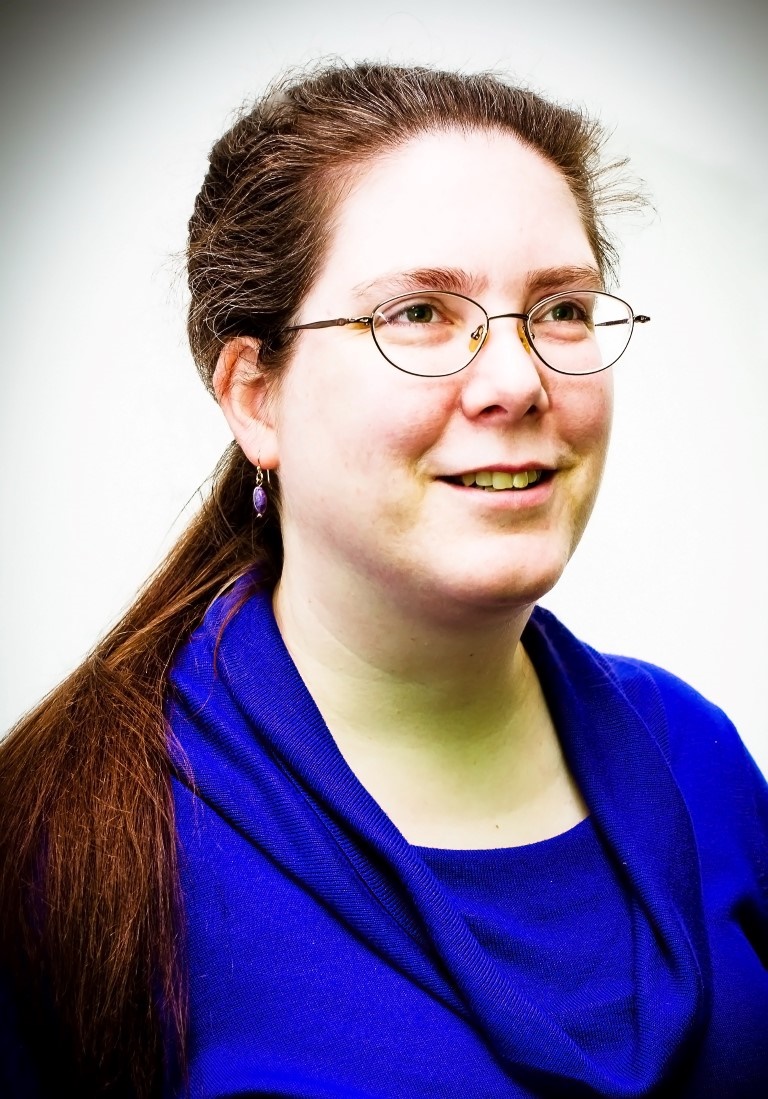 |
|
| photo: Deborah Drake | |
Genevieve Cogman is a freelance author who has written for several role-playing game companies. She works for the NHS in England as a clinical classifications specialist. The Invisible Library (Roc, June 14, 2016), a time-traveling fantasy, is her debut novel, and the first in a series.
On your nightstand now:
The top book by my bedside at this precise moment is Dry Manhattan: Prohibition in New York City by Michael A Lerner. The fiction book I'm in the middle of is A Mountain Walked: Great Tales of the Cthulhu Mythos, an anthology edited by S.T. Joshi. I'm also rereading Blood of Tyrants by Naomi Novik and An Ancient Peace by Tanya Huff. And Strange Tales from a Chinese Studio by Pu Songling (translated by John Minford) is also on the to-read pile as I write this. (My bedside is a crowded, crowded place.)
Favorite book when you were a child:
There were lots and lots of books--I was the sort of child who would go round to visit friends and had to be chased away from their bookshelves. But the single book that comes to mind is The Lord of the Rings by J.R.R. Tolkien. My parents read The Hobbit to me and my brother as a bedtime story when we were five or six years old, and when I was seven, they gave me my own copy of The Lord of the Rings. Of course I failed to appreciate large chunks of it, at that age. (Denethor was a bad man! Eowyn was a heroine! Sam and Frodo walked through a very boring place for a long while!) But I have constantly enjoyed rereading it and finding new things to appreciate in it. I also went on to The Silmarillion and The Book of Lost Tales, later. But if I had to point at a single book that was my favourite, that would be The Lord of the Rings.
Your top five authors:
This is a hard question to answer. Should I mention the authors I've enjoyed most? Or the ones that have had an influence on my writing? Or the ones that have caused me to consider questions of morality or reappraise my beliefs? Or the ones that haven't aged too well, but that gave me great pleasure when I was younger? I'll go with Terry Pratchett, Barbara Hambly, G.K. Chesterton, Suzette Haden Elgin and John Dickson Carr.
Book you've faked reading:
Frankenstein by Mary Shelley. I found it very heavy going and ended up skipping to the ending. Bram Stoker's Dracula was a lot more fun. (Well, for certain values of fun....)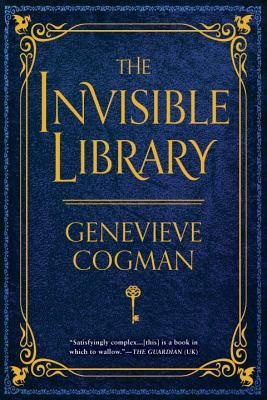 Book you're an evangelist for:
Book you're an evangelist for:
Rivers of London by Ben Aaronovitch (published as Midnight Riot in the United States). An absolute pleasure to read, and one that I've recommended to a lot of people. Several friends and family members got it as a Christmas present from me the year that it came out.
Book you've bought for the cover:
I'm not sure I've ever bought any book just for the cover. I do remember being very struck by the covers of the Ben Aaronovitch Rivers of London series mentioned above, and by the latest Naomi Novik book, Uprooted, but I think that I would have bought all of those anyhow, even if they'd been loitering on street corners in seedy brown paper jackets.
Book you hid from your parents:
No single book, but I know that when I was in my teens, and reading some really trashy fantasy and science fiction, that I wouldn't have wanted my parents to see it. It is probably true that there are some books you have to read before your taste improves enough to realize that they're bad, or why they're bad. But even when you're reading them, if you know that you don't want to have to discuss them with your parents over supper, then you've already realized that they're not that good.
Book that changed your life:
I'm not sure that I can think of any one single book that changed my life. Sorry.
Favorite line from a book:
Terry Pratchett, Going Postal: "And no practical definition of freedom would be complete without the freedom to take the consequences. Indeed, it is the freedom upon which all the others are based."
Five books you'll never part with:
Am I allowed compilations? I hope I'm allowed compilations.
My collected Sherlock Holmes by Sir Arthur Conan Doyle.
The Earthsea Quartet by Ursula le Guin.
The World of Jeeves by P.G Wodehouse.
Stalky & Co. by Rudyard Kipling.
Journey to the West, attributed to Wu Cheng'en.
Book you most want to read again for the first time:
The Phoenix Guards by Steven Brust. This and its sequels are a glorious pastiche of The Three Musketeers (and its sequels). Just plain fun to read.
The Light of Paris by Eleanor Brown (Putnam, $26 hardcover, 9780399158919, July 12, 2016)
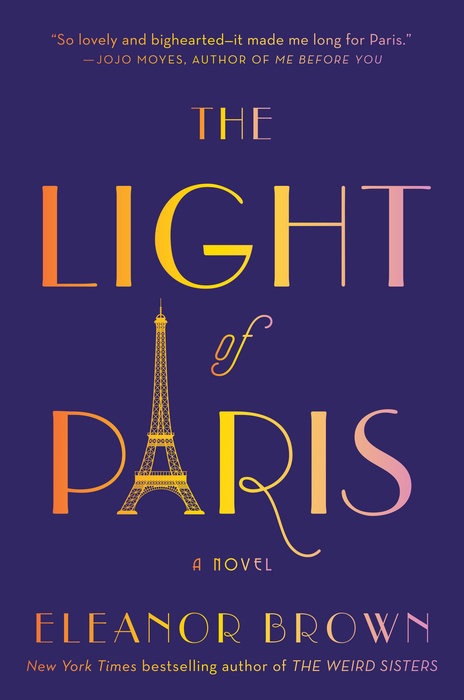 "Paris is always a good idea," Julia Ormond famously noted in the 1995 film version of Sabrina. For Margie Pearce, a shy, bookish debutante teetering dangerously close to spinsterhood in 1920s Washington, D.C., a trip to Paris comes at the right moment. After turning down a perfunctory and distinctly unappealing marriage proposal, Margie travels to Paris as chaperone to her willful young cousin, Evelyn. When Evelyn leaves the city with her bohemian friends and most of Margie's money, Margie defies her parents by deciding to stay in Paris alone and pursue her dream of becoming a writer. In her second novel, The Light of Paris, Eleanor Brown explores Margie's transformation and its far-reaching effect on her family, including her granddaughter Madeleine.
"Paris is always a good idea," Julia Ormond famously noted in the 1995 film version of Sabrina. For Margie Pearce, a shy, bookish debutante teetering dangerously close to spinsterhood in 1920s Washington, D.C., a trip to Paris comes at the right moment. After turning down a perfunctory and distinctly unappealing marriage proposal, Margie travels to Paris as chaperone to her willful young cousin, Evelyn. When Evelyn leaves the city with her bohemian friends and most of Margie's money, Margie defies her parents by deciding to stay in Paris alone and pursue her dream of becoming a writer. In her second novel, The Light of Paris, Eleanor Brown explores Margie's transformation and its far-reaching effect on her family, including her granddaughter Madeleine.
Brown (The Weird Sisters) begins her narrative in 1999, when Madeleine's frustration with her loveless marriage and unfulfilling life has reached the breaking point. During an impulsive visit to her childhood home, Madeleine unearths Margie's journals and letters from Paris. As she delves into this previously unknown facet of her grandmother's story, Madeleine wonders if she, too, can build a different life, one lived on her own terms instead of other people's. Through a series of encounters with old friends and the handsome new chef next door, Madeleine begins to dream of new possibilities for the first time in years.
Moving deftly between Madeleine's first-person voice and Margie's third-person narrative, Brown evokes the sensory images beloved by Francophiles: lush gardens, rich food and wine, elegant cafes buzzing with art and intellectual debate. But this isn't simply a retelling of the familiar American-in-Paris dream; it is a sensitive exploration of two women who feel trapped by the expectations of society and family. Although Madeleine and Margie have both made choices they later come to regret, Brown examines the pressures (personal and societal) that drove them to make those decisions, and the possibility for change. The novel also circles around the often fraught relationships between mothers and daughters. Both Margie and Madeleine feel inadequate next to their polished, society-matron mothers, and alternate between rebellion and a desperate need to please. Most of all, Brown's protagonists long for courage, for the bravery "to make space for themselves without waiting for an invitation."
Although Paris is "endless music and endless joy," it doesn't hold all the solutions for either of Brown's heroines. But its siren call of beauty and freedom pervades the novel, and leads to an open-ended but satisfying conclusion. Très bien! --Katie Noah Gibson, blogger at Cakes, Tea and Dreams
Shelf Talker: A woman trapped in a loveless marriage begins reconsidering her life choices after discovering her grandmother's letters and journals from Paris.
Among the responses I received to last week's column about piped music in bookshops was this one from a bookseller who wished to remain anonymous: "ASCAP is chasing us for our open mic programs. We have one for poets and one for songwriters; it's hard to fathom their complaint. I'd love to hear from others on that issue."
ASCAP's beef concerns "live music": "They want a general contract for musical venue. Supposedly, this would mean the Beatles would get a couple pennies if someone covered 'Hey Jude,' but in reality they wouldn't even know whose songs might be covered, so I doubt anyone would be paid except ASCAP. Our open mic is a songwriter's forum however, so local no-names are trying out their new compositions. We announce at every monthly session that only original tunes can be played, but ASCAP still worries some songwriter might make an allusion to 'Jude.' We're still working it out, but if we can't, I'll just cancel all live music."
Any other booksellers running into that challenge?
 |
|
| from Dancers Among Us (Workman) by Jordan Matter | |
On a lighter note, I also heard from legendary book-biz music guru (and PGW Party at BEA icon) Keith Arsenault, director of sales, Canada for Ingram Content Group. He recalled that the highlight of his early bookselling career was "the Christmas mix we played at College Hill Bookstore (RIP), which featured this classic track: Ren and Stimpy--'Fleck The Walls', courtesy of Mike Katz."
Renee Barker of The Bookstore in Glen Ellyn, Ill., told me: "We have music playing often, but certainly not always. Some of the employees try to keep music going, but some choose quiet. Years ago we had a cassette player, so we played and sold some cassettes of a particular pianist. Now we use an old donated iPod with a limited amount of music on it (that we are all getting tired of), mostly classical and mostly baroque, almost all instrumental only. For fun, we put on the waltzes or ragtime or klezmer playlists. We do play Christmas songs, usually without singers, and some Celtic music in March."
She added that the bookstore is considering changing to Spotify, and she would like to hear from other bookstores about that option. "There are two playlists that I like to use sparingly, but deliberately. One is The Killers Strings (for 25- to 30-year-olds; they nearly always perk up at one point and say out loud 'Wait, is that what I think it is?') and the other is orchestrated versions of the Disney movie theme songs, which the teenagers-to-20s in particular seem to love."
Karen Bakshoian of Letterpress Books, Portland, Maine, noted: "Well, after reading your article about Waterstones (an opinion leader if I ever knew one!), I feel guilty about playing our Celtic music however softly... and we don't even sell CDs. Several customers have remarked that they enjoy the music. When we play the Beatles on Tuesday, our Senior Discount Day, the customers whistle, dance and sing along."
Pageturners Bookstore in Indianola, Iowa, opts for Pandora radio. "I get to choose favorite artists (as many as I like) and Pandora Business plays those and similar artists and takes care of the pesky copyright fees too," said Kathy Magruder. "My store is too small to sell music, so this seemed the best option. Today we've had John Prine, the Oysterband, Yo-Yo Ma and the Nadas. Oh, and Great Big Sea singing 'Never trust a fella with a helmet on his head' (words to live by!)."
Charles Bottomley of the Northshire Bookstore, Manchester Center, Vt., recalled that a few years ago, they "switched from the floor manager's iPod to Pandora. We appear to have settled on a baroque playlist which is now played at an almost negligible volume--clarinets are burbling right now as I type this. This arrangement has brought a certain degree of peace to the bookstore. During the iPod years, there would be periodic revolts against the playlist, which usually involved a dose of Leo Kottke that was perhaps too robust for most people--some of the new age pudding that seeped out from the speakers on a daily basis may never leave my ears. The drawback of Pandora is that now when customers ask what CD is playing, we have to explain it's a streaming service--and often even when we identify a track and performer for them, we don't have the music in the store to handsell to them."
Noting that music "is a common subject of discussion for us, in part because my mother, who works occasionally in the store, has a limited tolerance of many genres," Harriett Logan of Loganberry Books, Shaker Heights, Ohio, observed: "In general, we have a wide collection to choose from, including classical, early music, jazz, world, folk, singer-songwriter, and a speck of pop. We give albums or songs a color code for emotional power (yellow is sunny, red is spirited or even angry, blue is, well, blue), a star-rating, and notes like Staff Picks or Mom-fail, so we can create closely curated playlists. Sometimes we'll spend a whole day on Celtic music, another day we might flit widely from Dvorak to didgeridoo to dulcimer. I like mixing it up (the color coding helps avoid really jarring transitions, but they still might be surprising). And it doesn't always work for my mother, who calls Mary Chapin Carpenter rap, and who can get angry at Mozart quartets if they play in the energy-lull of late afternoon. So it's a work in progress, and requires attention.
"I never tune out the background music, and I'm the first to complain if it stops. I don't like the empty silence, the way it makes people whisper like they're in a library, and the lack of energy pulse that good music provides. Of course people have different tastes, just like in books and bookstores. But we create an environment uniquely our own."
As I write this on Wednesday night in my office, I'm working without a soundtrack. No... wait, I do hear distant music after all. Not piped music. Live. Just over the hill from my house, Mumford & Sons are playing to a sold-out crowd at the Saratoga Performing Arts Center. I stare at my computer screen, wondering if that muted sound is "White Blank Page." --Robert Gray, contributing editor (Column archives available at Fresh Eyes Now)